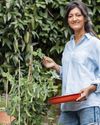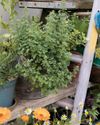
You'll learn about:
✓ Growing veg and ornamentals as companion plants
✓ Making use of every space
✓ Using containers to grow
Perfect partners
In gardening, there is an understandable misconception that flowers belong in borders and fruit and vegetables have plots of their own. All of which is fine and dandy if you have space to separate the different types of plant, but growing edibles and flowers together has been practised for centuries; what's more, it's mutually beneficial. Flowers attract pollinators to peas and beans, apples and pears, which need the intervention of insects to yield well, and by not having a concentration of any one crop in any one space, pest and disease infestations are often avoided. Give the mixture an artful design and you have a patch of earth that is both beautiful and useful.
Pretty and productive
A mix of edibles and ornamentals can be achieved on any scale you like - from the massive parterres of Villandry in France, to a tiny potager on a pocket-hanky patch, or simply a stretch of bed or border where flowers, trained fruit trees and vegetables can all play their part in a garden that looks good, tastes good and... well, does you good just be in it.
Where space is in short supply the same effect can be achieved in pots and containers, arranged to provide a succession of blooms and fruit and veg that will look attractive and offer sustenance from spring to autumn.
There's nothing new here. In the Middle Ages, monastery gardens would be a patchwork quilt of medicinal and culinary herbs, flowers for fragrance and beauty, and produce for the refectory.
Cottage gardeners from the 17th century onwards would pack their tiny plots with fruit, veg, herbs and flowers for the house.
Diese Geschichte stammt aus der March 2022-Ausgabe von Gardeners World.
Starten Sie Ihre 7-tägige kostenlose Testversion von Magzter GOLD, um auf Tausende kuratierte Premium-Storys sowie über 8.000 Zeitschriften und Zeitungen zuzugreifen.
Bereits Abonnent ? Anmelden
Diese Geschichte stammt aus der March 2022-Ausgabe von Gardeners World.
Starten Sie Ihre 7-tägige kostenlose Testversion von Magzter GOLD, um auf Tausende kuratierte Premium-Storys sowie über 8.000 Zeitschriften und Zeitungen zuzugreifen.
Bereits Abonnent? Anmelden

A new plot for tasty crops
Taking on a new allotment needn't be hard work. By simply following a few easy tips you can have bumper crops in no time, just like Alessandro Vitale

We love July
July is an island floating between the joy of June and the slightly fatigued month of August. It's a grown-up month: the year has shrugged off its adolescent exuberances, the weather is (hopefully) warm enough for ice cream to be one of your five a day, the sea should be swimmable without (too much) danger of hypothermia and thoughts will be of holiday shenanigans and family barbecues. School's out this month, the next tranche of glorious summer colour is washing across our borders and it's my birthday. Lots of reasons to give three rousing cheers for July!

YOUR PRUNING MONTH
Now, at the height of summer, Frances Tophill shows how to boost your plants' health and productivity with a timely cut

Hassle-free harvests
Flowers are out in abundance this month and for Jack Wallington, many of these blooms make delicious, low-effort pickings

Bite-sized bounties
Glorious doorstep harvests can easily turn into gluts, so let Rukmini Iyer's recipes help you savour every last bit

Upcycled outdoor living
Create unique and stylish garden features for minimal cost using reclaimed materials and simple DIY skills. Helen Riches shares four step-by-step projects and more inspiring eco tips

Secrets of a COLOURFUL GARDEN
Buildings and landscapes can play a vital role in supercharging your space, as Nick Bailey demonstrates

Greening up a city balcony
Looking for sustainable, small-space gardening ideas? Take inspiration from Oliver Hymans' transformed balcony garden in north-east London - now a lush, green haven for humans and wildlife

The dry and mighty garden
As we adapt our gardens to a more volatile climate, Alan Titchmarsh reveals how to create a drought-tolerant plot and picks his top plant performers

Nature knows best
Carol Klein explains how to choose plants for specific growing conditions, based on what has naturally adapted to thrive there